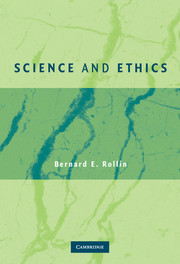Book contents
- Frontmatter
- Contents
- Acknowledgments
- Preface
- 1 The Waxing and Waning of Faith in Science
- 2 Scientific Ideology and “Value Free” Science
- 3 What Is Ethics?
- 4 Ethics and Research on Human Beings
- 5 Animal Research
- 6 Biotechnology and Ethics I: Is Genetic Engineering Intrinsically Wrong?
- 7 Biotechnology and Ethics II: Rampaging Monsters and Suffering Animals
- 8 Biotechnology and Ethics III: Cloning, Xenotransplantation, and Stem Cells
- 9 Pain and Ethics
- 10 Ethics in Science
- Bibliography
- Index
3 - What Is Ethics?
Published online by Cambridge University Press: 15 December 2009
- Frontmatter
- Contents
- Acknowledgments
- Preface
- 1 The Waxing and Waning of Faith in Science
- 2 Scientific Ideology and “Value Free” Science
- 3 What Is Ethics?
- 4 Ethics and Research on Human Beings
- 5 Animal Research
- 6 Biotechnology and Ethics I: Is Genetic Engineering Intrinsically Wrong?
- 7 Biotechnology and Ethics II: Rampaging Monsters and Suffering Animals
- 8 Biotechnology and Ethics III: Cloning, Xenotransplantation, and Stem Cells
- 9 Pain and Ethics
- 10 Ethics in Science
- Bibliography
- Index
Summary
Before we can explore the relationship between science and ethics, we must be clear about the general nature of ethics. This is particularly important in the age in which we live, since the rate of socio-ethical change has increased with great rapidity. As we shall see throughout our discussion, if professionals such as physicians, veterinarians, or researchers wish to keep their autonomy and steer their own ships, they must be closely attuned in an anticipatory way to changes and tendencies in social ethics and adjust their behavior to them, else they can be shackled by unnecessarily draconian restriction. And, as we saw in chapter 1 there have been numerous and bewildering ethical changes that professionals and others must adjust to throughout the second half of the twentieth century. There I catalogued some of the bewildering array of major socio-ethical changes that had developed in the second half of the twentieth century. As we shall see, failure of any subgroup in society to adjust to these ethical charges can result in major loss of freedom.
The first distinction that must be mastered is the difference between what I have called Ethics1 and Ethics2. Ethics1, or morality, is the set of beliefs that society, individuals, or subgroups of society hold about good and bad, right and wrong, justice and injustice, fairness and unfairness. Ethics2, on the other hand, is the logical examination, critique, and study of Ethics1. What we are doing in this chapter and indeed in this book is Ethics2.
- Type
- Chapter
- Information
- Science and Ethics , pp. 31 - 65Publisher: Cambridge University PressPrint publication year: 2006



